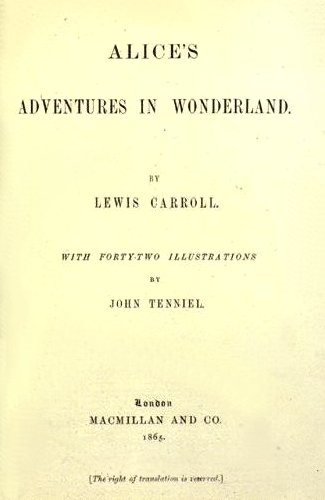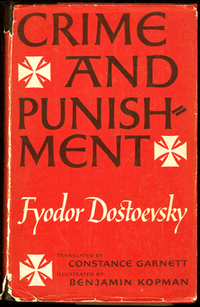
Alice's Adventures in Wonderland (commonly known simply as "Alice in Wonderland") is a novel written by English author Charles Lutwidge Dodgson under the pseudonym Lewis Carroll
Alice was written in 1865

One summer day Alice was sitting on the riverbank with her older sister. Alice’s sister was reading a book and Alice noticed that the book didn’t
have any pictures, which made Alice lose interest in it. Then as she
looked out into the meadow, she saw something very peculiar. She saw
a large white rabbit running past her looking at his watch saying “Oh
dear! Oh dear! I shall be too late.” Then he popped down a rabbit hole. Alice, being the curious girl she was, followed the rabbit down that hole and found herself in a land with many wonders. It was a wonderland. She met some interesting creatures including the King and Queen of Hearts, the Hatter, and the March Hare. She found that many creatures in this land didn’t have the best of tempers and didn’t want to try to help Alice figure out where to go and what to do. Alice also found herself changing sizes after eating or drinking things she found. One minute she was a few inches tall and the next she was nine feet tall. When Alice was in this land she expected the unexpected and didn’t think much of the unusual occurrences. She used her knowledge to help other people, such as when she made sense of evidence during a trial. As much as Alice thought it interesting being with these strange creatures and trying to get along with them, she wondered when she would return home to her normal life or if she would. She remembered her cat and dreamed of seeing him again. But was there a way to get out or was it all just a dream?
have any pictures, which made Alice lose interest in it. Then as she
looked out into the meadow, she saw something very peculiar. She saw
a large white rabbit running past her looking at his watch saying “Oh
dear! Oh dear! I shall be too late.” Then he popped down a rabbit hole. Alice, being the curious girl she was, followed the rabbit down that hole and found herself in a land with many wonders. It was a wonderland. She met some interesting creatures including the King and Queen of Hearts, the Hatter, and the March Hare. She found that many creatures in this land didn’t have the best of tempers and didn’t want to try to help Alice figure out where to go and what to do. Alice also found herself changing sizes after eating or drinking things she found. One minute she was a few inches tall and the next she was nine feet tall. When Alice was in this land she expected the unexpected and didn’t think much of the unusual occurrences. She used her knowledge to help other people, such as when she made sense of evidence during a trial. As much as Alice thought it interesting being with these strange creatures and trying to get along with them, she wondered when she would return home to her normal life or if she would. She remembered her cat and dreamed of seeing him again. But was there a way to get out or was it all just a dream?









